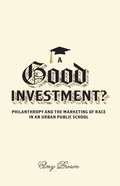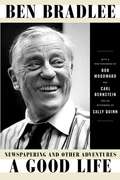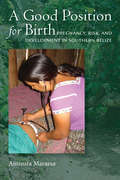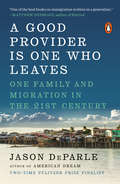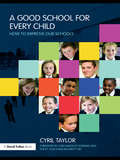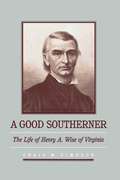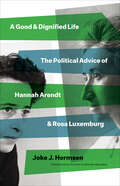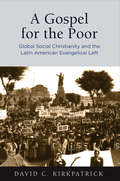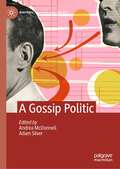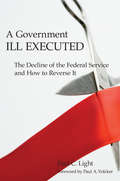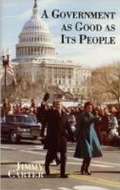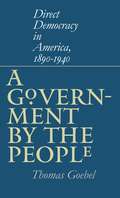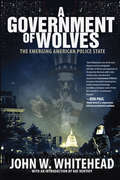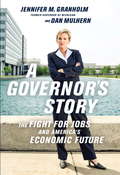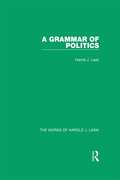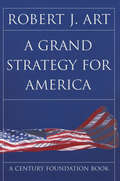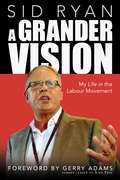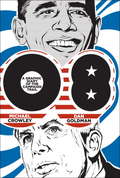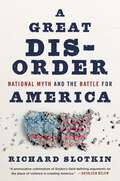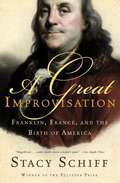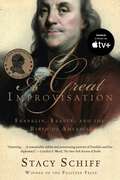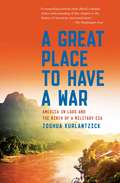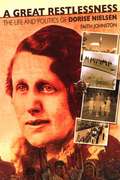- Table View
- List View
A Good Investment?: Philanthropy and the Marketing of Race in an Urban Public School
by Amy BrownSelect students and teachers worked the room at a fundraising event for a New York City public high school Amy Brown calls College Preparatory Academy. It was their job to convince wealthy attendants that College Prep, with its largely minority and disadvantaged student body and its unusually high rate of graduation and college acceptance, was a worthy investment. To this end, students and teachers tried to seem needy and deserving, hoping to make supporters feel generous, important, and not threatened. How much, Brown asks, does competition for financing in urban public schools depend on marketing and perpetuating poverty in order to thrive? And are the actors in this drama deliberately playing up stereotypes of race and class?A Good Investment? offers a firsthand look behind the scenes of the philanthropic approach to funding public education—a process in which social change in education policy and practice is aligned with social entrepreneurship. The appearance of success, equity, or justice in education, Brown argues, might actually serve to maintain stark inequalities and inhibit democracy. Her book shows that models of corporate or philanthropic charity in education can in fact reinforce the race and class hierarchies that they purport to alleviate.As their voices reveal, the teachers and students on the receiving end of such a system can be critically conscious and ambivalent participants in a school&’s racialized marketing and image management. Timely and provocative, this nuanced work exposes the unintended consequences of an education marketplace where charity masquerades as justice.
A Good Life: Newspapering and Other Adventures
by Ben BradleeThis is the witty, candid story of a daring young man who made his own way to the heights of American journalism and public life, of the great adventure that took him at only twenty years old straight from Harvard to almost four years in the shooting war in the South Pacific, and back, from a maverick New Hampshire weekly to an apprenticeship for Newsweek in postwar Paris, then to the Washington Bureau chief's desk, and finally to the apex of his career at The Washington Post. <P> Bradlee took the helm of The Washington Post in 1965. He and his reporters transformed it into one of the most influential and respected news publications in the world, reinvented modern investigative journalism, and redefined the way news is reported, published, and read. Under his direction, the paper won eighteen Pulitzer prizes. His leadership and investigative drive following the break-in at the Democratic National Committee led to the downfall of a president, and kept every president afterward on his toes. Bradlee, backed every step of the way by the Graham family, challenged the federal government over the right to publish the Pentagon Papers - and won. His ingenuity, and the spirited reporting of Sally Quinn, now his wife, led to the creation of the Style Section, a revolutionary newspaper feature in its time, now copied by just about every paper in the country.
A Good Position for Birth: Pregnancy, Risk, and Development in Southern Belize
by Aminata MaraesaIn order to understand the local realities of health and development initiatives undertaken to reduce maternal and infant mortality, the author accompanied rural health nurses as they traveled to villages accessible only by foot over waterlogged terrain to set up mobile prenatal and well-child clinics. Through sustained interactions with pregnant women, midwives, traditional birth attendants, and bush doctors, Maraesa encountered reproductive beliefs and practices ranging from obeah pregnancy to 'nointing that compete with global health care workers' directives about risk, prenatal care, and hospital versus home birth.Fear and shame are prominent affective tropes that Maraesa uses to understand women's attitudes toward reproduction that are at times contrary to development discourse but that make sense in the lived experiences of the women of southern Belize.
A Good Position for Birth: Pregnancy, Risk, and Development in Southern Belize
by Aminata MaraesaIn order to understand the local realities of health and development initiatives undertaken to reduce maternal and infant mortality, the author accompanied rural health nurses as they traveled to villages accessible only by foot over waterlogged terrain to set up mobile prenatal and well-child clinics. Through sustained interactions with pregnant women, midwives, traditional birth attendants, and bush doctors, Maraesa encountered reproductive beliefs and practices ranging from obeah pregnancy to 'nointing that compete with global health care workers' directives about risk, prenatal care, and hospital versus home birth. Fear and shame are prominent affective tropes that Maraesa uses to understand women's attitudes toward reproduction that are at times contrary to development discourse but that make sense in the lived experiences of the women of southern Belize.
A Good Provider Is One Who Leaves: One Family and Migration in the 21st Century
by Jason DeParle"No matter your politics or home country this will change how you think about the movement of people between poor and rich countries...one of the best books on immigration written in a generation." --Matthew Desmond, author of EvictedThe definitive chronicle of our new age of global migration, told through the multi-generational saga of a Filipino family, by a veteran New York Times reporter and two-time Pulitzer Prize finalist.When Jason DeParle moved into the Manila slums with Tita Comodas and her family three decades ago, he never imagined his reporting on them would span three generations and turn into the defining chronicle of a new age--the age of global migration. In a monumental book that gives new meaning to "immersion journalism," DeParle paints an intimate portrait of an unforgettable family as they endure years of sacrifice and separation, willing themselves out of shantytown poverty into a new global middle class. At the heart of the story is Tita's daughter, Rosalie. Beating the odds, she struggles through nursing school and works her way across the Middle East until a Texas hospital fulfills her dreams with a job offer in the States. Migration is changing the world--reordering politics, economics, and cultures across the globe. With nearly 45 million immigrants in the United States, few issues are as polarizing. But if the politics of immigration is broken, immigration itself--tens of millions of people gathered from every corner of the globe--remains an underappreciated American success. Expertly combining the personal and panoramic, DeParle presents a family saga and a global phenomenon. Restarting her life in Galveston, Rosalie brings her reluctant husband and three young children with whom she has rarely lived. They must learn to become a family, even as they learn a new country. Ordinary and extraordinary at once, their journey is a twenty-first-century classic, rendered in gripping detail.
A Good School for Every Child: How to improve our schools
by Cyril TaylorSir Cyril Taylor has been at the heart of English education for over two decades, serving as an adviser to ten successive UK Education Secretaries and Four Prime Ministers, both Conservative and Labour, including Margaret Thatcher and Tony Blair. His passion for education has led directly to real school improvement, from the creation of City Technology Colleges to specialist schools and academies, which together now constitute over nine in ten secondary schools in England. The Specialist Schools and Academies Trust, the body he founded, is now a leading force in school improvement worldwide. A Good School for Every Child draws on that wealth of experience. While offering an insider's look at some of the key challenges in education, it is also an invaluable guide for parents and teachers interested in how our schools work today. There is a particular focus on how to raise standards in low attaining schools, improving levels of literacy and numeracy and teaching our children the skills they need for the 21st Century. This book is also a clarion call to our political leaders about the challenges that still remain: the education of children in care, the failure to stretch able youngsters and the problems recruiting enough good science teachers. Education is more open today than ever before, with league tables and inspection reports. Yet for many outsiders, it can seem a world clouded by its own language and rituals. Cyril Taylor opens the door to that world, through stories of inspirational headteachers and successful schools. By doing so he offers a vision that is both instructive and inspirational, one that shows how schools working with parents and the wider community can raise the standards of achievement for all their pupils.
A Good Southerner
by Craig M. SimpsonWise (1806-76) was extremely active on the Virginia and national political scene from the early 1830s to the mid-1860s, drawing popular support because of his projection of hopefulness and energy. Regarded as eccentric, Wise is given, in this study, an interpretation that finds consistency in his life-long controversial and impulsive behavior. Simpson stresses Wise's ambivalent attitude toward slaves and slave-holding, authority and authority figures, and Virginia and the United States.
A Good and Dignified Life: The Political Advice of Hannah Arendt and Rosa Luxemburg (The Margellos World Republic of Letters)
by Joke J HermsenA timely and provocative essay about the parallel lives of Rosa Luxemburg and Hannah Arendt and their mission for a more humane society &“An intimate and timely meditation on dark times, Hermsen&’s illuminating essay offers readers a way to think with Hannah Arendt and Rosa Luxemburg about how to build a more humane world in common.&”—Samantha Rose Hill, author of Hannah Arendt Rosa Luxemburg (1871–1919) and Hannah Arendt (1906–1975) were critical Jewish mavericks who both suffered under violent political regimes and sought to reform systems of power. Although temporally separated by the Second World War and the rise of totalitarianism, they held in common strikingly similar convictions about freedom, human dignity, capitalism, democracy, and political commitment. In this powerful book, Joke J. Hermsen explores the lives and works of these two remarkable thinkers and the essential hope that emboldened them in the political struggle. Luxemburg and Arendt were spurred on by a restless love for the world and an unwavering belief in the possibility of new beginnings; for them, hope was an absolute prerequisite of resistance and a counterpoint to melancholy—a defense against despair that kept them attuned to what could be. Exploring the intertwined nature of philosophy and the active pursuit of justice, this is an urgent, courageous reminder to remain alert to the glimmers of hope in dark times.
A Gospel for the Poor: Global Social Christianity and the Latin American Evangelical Left
by David C. KirkpatrickIn 1974, the International Congress on World Evangelization met in Lausanne, Switzerland. Gathering together nearly 2,500 Protestant evangelical leaders from more than 150 countries and 135 denominations, it rivaled Vatican II in terms of its influence. But as David C. Kirkpatrick argues in A Gospel for the Poor, the Lausanne Congress was most influential because, for the first time, theologians from the Global South gained a place at the table of the world's evangelical leadership—bringing their nascent brand of social Christianity with them.Leading up to this momentous occasion, after World War II, there emerged in various parts of the world an embryonic yet discernible progressive coalition of thinkers who were embedded in global evangelical organizations and educational institutions such as the InterVarsity Christian Fellowship, the International Fellowship of Evangelical Students, and the International Fellowship of Evangelical Mission Theologians. Within these groups, Latin Americans had an especially strong voice, for they had honed their theology as a religious minority, having defined it against two perceived ideological excesses: Marxist-inflected Catholic liberation theology and the conservative political loyalties of the U.S. Religious Right.In this context, transnational conversations provoked the rise of progressive evangelical politics, the explosion of Christian mission and relief organizations, and the infusion of social justice into the very mission of evangelicals around the world and across a broad spectrum of denominations. Drawing upon bilingual interviews and archives and personal papers from three continents, Kirkpatrick adopts a transnational perspective to tell the story of how a Cold War generation of progressive Latin Americans, including seminal figures such as Ecuadorian René Padilla and Peruvian Samuel Escobar, developed, named, and exported their version of social Christianity to an evolving coalition of global evangelicals.
A Gossip Politic (Rhetoric, Politics and Society)
by Adam Silver Andrea McDonnellThis book makes explicit the historical, technological, and discursive links between gossip as a mode of communication, news media, and contemporary politics. A Gossip Politic advances a new framework of gossip, applying the informal understanding of the term to news talk and political actors. Authored by esteemed scholars in the fields of Political Science, Media Studies, Linguistics, and Sociology, chapters consider the influence of gossip on the press, the American presidency, and the public. A Gossip Politic provides readers with a multi-faceted portrait of the ways in which gossip has influenced media history, shaped our understanding of democracy, and contributed to our current political landscape.
A Government Ill Executed: The Decline of the Federal Service and How to Reverse It
by Paul C. LightThe federal government is having increasing difficulty faithfully executing the laws, which is what Alexander Hamilton called “the true test” of a good government. This book diagnoses the symptoms, explains their general causes, and proposes ways to improve the effectiveness of the federal government. Employing Hamilton’s seven measures of an energetic federal service, Paul Light shows how the government is wanting in each measure. After assessing the federal report card, Light offers a comprehensive agenda for reform, including new laws limiting the number of political appointees, reducing the layers of government management, reducing the size of government as its baby-boom employees retire, revitalizing the federal career, and reducing the heavy outsourcing of federal work. Although there are many ways to fix each of the seven problems with government, only a comprehensive agenda will bring the kind of reform needed to reverse the overall erosion of the capacity to faithfully execute all the laws.
A Government Out of Sight
by Brian BaloghWhile it is obvious that America's state and local governments were consistently active during the nineteenth century, a period dominated by laissez-faire, political historians of twentieth-century America have assumed that the national government did very little during this period. A Government Out of Sight, first published in 2009, challenges this premise, chronicling the ways in which the national government intervened powerfully in the lives of nineteenth-century Americans through the law, subsidies, and the use of third parties (including state and local governments), while avoiding bureaucracy. Americans have always turned to the national government - especially for economic development and expansion - and in the nineteenth century even those who argued for a small, nonintrusive central government demanded that the national government expand its authority to meet the nation's challenges. In revising our understanding of the ways in which Americans turned to the national government throughout this period, this study fundamentally alters our perspective on American political development in the twentieth century, shedding light on contemporary debates between progressives and conservatives about the proper size of government and government programs and subsidies that even today remain 'out of sight'.
A Government as Good as Its People
by Jimmy Carter"This volume presents sixty-two of the best and most notable public statements made by Jimmy Carter on his way to becoming president of the United States. Included are formal speeches on specific issues, such as "Pardon Yes, Amnesty, No" delivered in Seattle, Washington, August 24, 1976; news conferences like the one on "Ethnic Purity" conducted for the American Society of Newspaper Editors in Washington, D.C., April 13, 1976; informal remarks made to political gatherings; interviews (including the controversial Playboy interview from November 1976); and excerpts from the debates with President Ford." "Available again in paperback, this sampling of President Carter's philosophy is extremely readable. Carter's public pronouncements address the major concerns of our time - crime, taxes, technology, poverty, nuclear energy, world order, foreign policy, urban sprawl, human rights, the American family - and collectively stand as a testament to his deeply held conviction that we still can, and must, have "a government as good as its people.""--BOOK JACKET. Title Summary field provided by Blackwell North America, Inc. All Rights Reserved
A Government by the People: Direct Democracy in America, 1890-1940
by Thomas GoebelBetween 1898 and 1918, many American states introduced the initiative, referendum, and recall--known collectively as direct democracy. Most interpreters have seen the motives for these reform measures as purely political, but Thomas Goebel demonstrates that the call for direct democracy was deeply rooted in antimonopoly sentiment. Frustrated with the governmental corruption and favoritism that facilitated the rise of monopolies, advocates of direct democracy aimed to check the influence of legislative bodies and directly empower the people to pass laws and abolish trusts. But direct democracy failed to achieve its promises: corporations and trusts continued to flourish, voter turnout rates did not increase, and interest groups grew stronger. By the 1930s, it was clear that direct democracy favored large organizations with the financial and organizational resources to fund increasingly expensive campaigns. Recent years have witnessed a resurgence of direct democracy, particularly in California, where ballot questions and propositions have addressed such volatile issues as gay rights and affirmative action. In this context, Goebel's analysis of direct democracy's history, evolution, and ultimate unsuitability as a grassroots tool is particularly timely.
A Government of Wolves: The Emerging American Police State
by Nat Hentoff John W. Whitehead"A NATION OF SHEEP WILL BEGET A GOVERNMENT OF WOLVES"-EDWARD R. MURROW America is fast moving into a state of lockdown. Surveillance cameras, drug-sniffing dogs, SWAT team raids, roadside strip searches, blood draws at DUI checkpoints, mosquito drones, tasers, privatized prisons, GPS tracking devices, zero tolerance policies, overcriminalization, free speech zones-these are all symptoms of the emerging police state in America. A GOVERNMENT OF WOLVES paints a chilling portrait of a nation in the final stages of transformation into outright authoritarianism, whose citizens have become little more than a nation of suspects to be cowed, corralled, and controlled. Pulling from his extensive knowledge of constitutional law, history, and futuristic films, John W. Whitehead helps readers navigate this treacherous terrain and provides them with a blueprint for hopefully finding their way back to freedom.
A Governor's Story: The Fight for Jobs and America's Economic Future
by Jennifer Granholm Dan MulhernJennifer Granholm was the two-term governor of Michigan, a state synonymous with manufacturing during a financial crisis that threatened to put all AmericaOCOs major car companies into bankruptcy. The immediate and knock-on effects were catastrophic. GranholmOCOs grand plans for education reform, economic revitalization, clean energy, and infrastructure development were blitzed by a perfect economic storm. Granholm was a determined and undefeated governor, who enjoyed close access to the White House at critical moments (Granholm stood in for Sarah Palin during Joe BidenOCOs debate preparation), and her account offers a front row seat on the effects of the crisis. Ultimately, her story is a model of hope. She hauls Michigan towards unprecedented private-public partnerships, forged in the chaos of financial freefall, built on new technologies that promise to revolutionize not only the century-old auto industry but MichiganOCOs entire manufacturing base. They offer the potential for a remarkable recovery not just for her state, but for American industry nationwide.
A Grammar of Politics (The Works of Harold J. Laski)
by Harold J. LaskiLaski’s magnum opus, this volume outlines the history and functions of state institutions which (in the author’s view) are desirable for the effective functioning of a democracy. Topics discussed include: The necessity of government; state and society; rights and power; liberty and equality; property as a theory of industrial organisation; the nature of nationalism; law as a source of authority; the functions of international organisations.
A Grand Strategy for America (Cornell Studies in Security Affairs)
by Robert J. ArtThe United States today is the most powerful nation in the world, perhaps even stronger than Rome was during its heyday. It is likely to remain the world's preeminent power for at least several decades to come. What behavior is appropriate for such a powerful state? To answer this question, Robert J. Art concentrates on "grand strategy"-the deployment of military power in both peace and war to support foreign policy goals. He first defines America's contemporary national interests and the specific threats they face, then identifies seven grand strategies that the United States might contemplate, examining each in relation to America's interests. The seven are: -dominion-forcibly trying to remake the world in America's own image; - global collective security-attempting to keep the peace everywhere; -regional collective security-confining peacekeeping efforts to Europe; - cooperative security-seeking to reduce the occurrence of war by limiting other states' offensive capabilities; - isolationism-withdrawing from all military involvement beyond U. S. borders; -containment-holding the line against aggressor states; and -selective engagement-choosing to prevent or to become involved only in those conflicts that pose a threat to the country's long-term interests. Art makes a strong case for selective engagement as the most desirable strategy for contemporary America. It is the one that seeks to forestall dangers, not simply react to them; that is politically viable, at home and abroad; and that protects all U. S. interests, both essential and desirable. Art concludes that "selective engagement is not a strategy for all times, but it is the best grand strategy for these times. "
A Grander Vision: My Life in the Labour Movement
by Sid RyanA stirring, heartfelt manifesto written by a man who fervently believes in what workers with their civil society allies can achieve for the good of all. Sid Ryan, one of Canada’s most courageous and progressive union leaders, draws on the experience of his varied and colourful life to show what is right with the labour movement, what is wrong, and what has to change if it is to avoid becoming irrelevant. In A Grander Vision, Ryan calls for the adoption of social movement unionism, in which labour forges an alliance with other progressive elements in civil society, taking up the cause of young people, precarious workers, and immigrants. Ryan asserts that a renewed commitment to the NDP — the party that was built by unions — is necessary and that the Leap Manifesto should become the pillar of the movement in Canada.
A Graphic Diary Of The Campaign Trail
by Michael CrowleyA Graphic Retelling Of The Most Historic Election Of Our Time Beyond the pandering focus groups, the billion-dollar fund-raising machinery, and the relentless myopia of the 24-hour news cycle, it was clear that something deep in the American psyche was stirring as the rumblings of the 2008 election first began. 08' follows the epic 2008 presidential campaign and its dramatic cast of characters: the inevitable former first lady with a terrible plan to win, the freshman African-American Senator who skyrockets onto the national stage, and a former POW's hangdog campaign that overcomes both a Mormon Governor and a thrice-married (occasionally cross-dressing) Mayor. <P> Taking its cur from campaign classics like Fear and Loathing on the Campaign Trail '72 and The Making of the President Series, 08 brings politico journalism into the graphic novel form. Reflect on all the single-issue candidates, the pundits, the meltdowns, the awkward missteps, and the ruthless maneuvers of the scorched-earth campaign trail as they knit themselves into a political tale of the present-day battle for the future of America. <P> <i>Advisory: Bookshare has learned that this book offers only partial accessibility. We have kept it in the collection because it is useful for some of our members. To explore further access options with us, please contact us through the Book Quality link on the right sidebar. Benetech is actively working on projects to improve accessibility issues such as these. </i>
A Great Disorder: National Myth and the Battle for America
by Richard SlotkinAs culture wars pit us against each other, A Great Disorder looks to the myths that have shaped American identity and reveals how they have brought us to the brink of an existential crisis.Red America and Blue America are so divided they could be two different countries, with wildly diverging views of why government exists and who counts as American. Their ideologies are grounded in different versions of American history, endorsing irreconcilable visions of patriotism and national identity.A Great Disorder is a bold, urgent work that helps us make sense of today’s culture wars through a brilliant reconsideration of America’s foundational myths and their use in contemporary politics. Famous for his trilogy on the Myth of the Frontier, Richard Slotkin identifies five myths, born of different eras, that have shaped our conception of what it means to be American: the myths of the Frontier, the Founding, the Civil War (which he breaks into two opposing camps, Emancipation and the Lost Cause), and the Good War, embodied by the multiethnic platoon fighting for freedom. His argument is that while Trump and his MAGA followers have played up a frontier-inspired hostility to the federal government and rallied around Confederate symbols to champion a racially exclusive definition of American nationality, Blue America, taking its cue from the protest movements of the 1960s, envisions a limitlessly pluralistic country in which the federal government is the ultimate enforcer of rights and opportunities. American history—and the foundations of our democracy—have become a battleground. It is not clear at this time which vision will prevail.
A Great Improvisation: Franklin, France, and the Birth of America
by Stacy SchiffStacy Schiff draws from new and little-known sources to illuminate the least-explored part of Franklin's life. From these pages emerge a particularly human and yet fiercely determined Founding Father, as well as a profound sense of how fragile, improvisational, and international was our country's bid for independence.
A Great Improvisation: Franklin, France, and the Birth of America
by Stacy SchiffSoon to be a streaming series ● In this dazzling work of history, a Pulitzer Prize-winning author follows Benjamin Franklin to France for the crowning achievement of his careerIn December of 1776 a small boat delivered an old man to France." So begins an enthralling narrative account of how Benjamin Franklin--seventy years old, without any diplomatic training, and possessed of the most rudimentary French--convinced France, an absolute monarchy, to underwrite America's experiment in democracy. When Franklin stepped onto French soil, he well understood he was embarking on the greatest gamble of his career. By virtue of fame, charisma, and ingenuity, Franklin outmaneuvered British spies, French informers, and hostile colleagues; engineered the Franco-American alliance of 1778; and helped to negotiate the peace of 1783. The eight-year French mission stands not only as Franklin's most vital service to his country but as the most revealing of the man.In A Great Improvisation, Stacy Schiff draws from new and little-known sources to illuminate the least-explored part of Franklin's life. Here is an unfamiliar, unforgettable chapter of the Revolution, a rousing tale of American infighting, and the treacherous backroom dealings at Versailles that would propel George Washington from near decimation at Valley Forge to victory at Yorktown. From these pages emerge a particularly human and yet fiercely determined Founding Father, as well as a profound sense of how fragile, improvisational, and international was our country's bid for independence.
A Great Place to Have a War: America in Laos and the Birth of a Military CIA
by Joshua KurlantzickThe untold story of how America&’s secret war in Laos in the 1960s transformed the CIA from a loose collection of spies into a military operation and a key player in American foreign policy.January, 1961: Laos, a tiny nation few Americans have heard of, is at risk of falling to communism and triggering a domino effect throughout Southeast Asia. This is what President Eisenhower believed when he approved the CIA&’s Operation Momentum, creating an army of ethnic Hmong to fight communist forces there. Largely hidden from the American public—and most of Congress—Momentum became the largest CIA paramilitary operation in the history of the United States. The brutal war lasted more than a decade, left the ground littered with thousands of unexploded bombs, and changed the nature of the CIA forever. With &“revelatory reporting&” and &“lucid prose&” (The Economist), Kurlantzick provides the definitive account of the Laos war, focusing on the four key people who led the operation: the CIA operative whose idea it was, the Hmong general who led the proxy army in the field, the paramilitary specialist who trained the Hmong forces, and the State Department careerist who took control over the war as it grew. Using recently declassified records and extensive interviews, Kurlantzick shows for the first time how the CIA&’s clandestine adventures in one small, Southeast Asian country became the template for how the United States has conducted war ever since—all the way to today&’s war on terrorism.
A Great Restlessness: The Life and Politics of Dorise Nielsen
by Faith JohnstonDorise Nielsen was a pioneering feminist, a radical politician, the first Communist elected to Canadaís House of Commons, and the only woman elected in 1940. But despite her remarkable career, until now little has been known about her.From her youth in London during World War I to her burial in 1980 in a heroís cemetery in China, Nielsen lived through tumultuous times. Struggling through the Great Depression as a homesteaderís wife in rural Saskatchewan, Nielsen rebelled against the poverty and injustice that surrounded her, and found like-minded activists in the CCF and the Communist Party of Canada. In 1940 when leaders of the Communist Party were either interned or underground, Nielsen became their voice in Parliament. But her activism came at a high price. As a single mother in Ottawa, she sacrificed a close relationship with her family for her career. As a woman in an emerging political organisation, her authority was increasingly usurped by younger male party members. As a committed communist, she moved to Mao's China in 1957 and dedicated her lifeís work to a cause that went seriously awry.Faith Johnston illuminates the life of a woman who paved the way for a generation of women in politics, who tried to be both a good mother and a good revolutionary, and who refused to give up on either.
